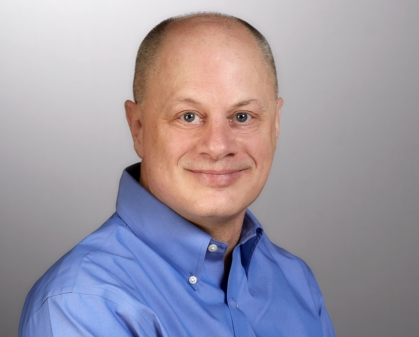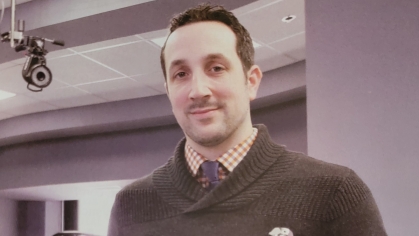Alumni Spotlight: Tim Dasey, PhD

After receiving his PhD in biomedical engineering, Tim Dasey launched a 30-year career with the MIT Lincoln Laboratory, a government funded laboratory that researches and develops technology that supports national security. Today, he is an author and strategic educational consultant, whose first book, Wisdom Factories: AI, Games, and the Education of a Modern Worker, came out in June 2023. It draws on his experience with AI, to propose a new educational model that trains modern workplace leaders by focusing on wisdom skills such as critical thinking and relationships as AI increasingly becomes a source of workforce expertise.
Why Rutgers and BME?
I studied electrical engineering at Clarkson but also took a lot of biology courses as I was interested in both biology and engineering. I got a fellowship to Rutgers and went straight to the BME PhD program.
What was your primary focus at MIT Lincoln Laboratory?
The Lincoln Lab is different from the rest of MIT, as a Federally -Funded Research and Development Center in Lexington, Massachusetts. I largely worked on AI in everything from national security and public health to law enforcement, and led an AI group for six years. I spent 10 years leading a group in defending against potential chemical and biological attacks that could be even more serious than Covid.
I was a manager for 20 years and hired hundreds of people. I always looked for people who were broadly curious and who had some evidence in their backgrounds for multiple perspectives – such as a computer major who minored in French. A different set of perspectives would give them better general thinking skills that could help them more readily adapt to new, unanticipated tasks, and bridge communities.
A lot of innovations happen at the seams between disciplines, and a big part of diversity is diversity of thought.
What most excites you about AI?
I first got involved in AI, because I was working in BME labs learning a lot about the brain. AI’s neural network systems parallel how brains learn.
I realized I wanted to transform my career from building AI to helping people deal with it.
Tim Dasey
Why did you decide to make a leap to the user and strategy side of technology?
I saw that I wanted to do things I couldn’t do in my position at MIT. Really, I started to worry. I’d been thinking about where AI was going quite a bit. I realized I wanted to transform my career from building AI to helping people deal with it.
We’re on the cusp of a lot of changes in the workplace. Higher paying jobs will require 21st-century skills such as creative thinking, problem solving, and leadership – and we need big thinkers.
A recent Gallup Poll found that only 10% of people have the skills to lead. We have a problem if we’re not developing these skills in people, so I turned my thoughts to education.
What insights did you gain?
I did a lot of research on educational theory to supplement my background in neuroscience and psychology. By filling up students’ heads with a lot of knowledge rather than teaching them how to think critically and problem solve, schools are not on the right track for preparing students to deal with AI automation.
Because knowledge is available on demand from AI, a top-down way of teaching based on a wisdom-oriented curriculum that builds 21st century skills, not knowledge areas, should be the priority. And AI unfortunately is widening the gulf between high and low skills and high and low paid workers.
What solutions do you offer in your book?
Most people will go through two or three careers – which means the ability to adapt is more critical than your knowledge base. The challenge is to prepare students for what industry wants and needs. The need for workers who I would characterize as good general thinkers is rising dramatically, but the number of them is not.
Knowledge should be taught as something to grab to solve a problem, so there’s a direct connection between knowledge and its use. If you wanted to build a tree and were handed a pile of leaves, you can’t make a tree. You need the trunk, the roots, the branches. A lot of knowledge is just getting the leaves, but not the connections.
How do games figure in your book?
Games can help people learn at all levels – from K-12 to higher education and in the workplace by fostering big picture thinking skills. I have a decade of experience with games. At MIT when we started to ask people how they wanted to use automation, they didn’t have an answer. If we created a game and put them in a job-related situation, after they finished playing the game, they would come back with all kinds of ideas.
This flips the model from knowledge-based to experience-based. Experiential learning can take a long time, but games, for example, allowed us to put operators in public health disaster management in situations and ask them to try to solve a problem. We did this to see what AI we should build for them. We found out it taught them a lot about thinking about problems at a high level.
Are you concerned about AI as an existential threat?
My book’s not about that existential threat, but I do worry about it for a lot of reasons. There are some indications that we’re not that far away from the threat and don’t know how to control it – and that we’re not likely to know when we do reach that point. We can build AI systems, but it can take time to see what they can do. If AI becomes superhuman intelligent, and it already is a little, chances are it is not going to tell us, or it will lie.
We don’t know how they know to lie. An AI ChatBot’s goal is to solve a problem. It doesn’t have a notion of values, and we don’t know how to give them that.
This makes it way more concerning. If AI becomes able to acto on its goals through building software, for example, then it could evolve far faster than we can understand, control, and regulate it.
What do you most value about your Rutgers education?
It gave me a focus on big picture thinking. I usually wasn’t taught through lectures. We were focused on building and creating, so the learning emphasis was experiential. I certainly felt that how I was taught helped to foster the kind of skills I’m talking about in my book. In BME, at the time, we were in rudimentary mobile homes stitched together, which didn’t really matter, as we were in such a rich learning environment. I was always trying to do something, and almost all the faculty were inherently interdisciplinary.
What advice do you have for today’s engineering students?
Number one, think of yourself as a thinker and not a specialist. You may be learning a specialty, but over the long-haul your career will go in directions you never considered.
As a thinker, you’ll be able to branch out, so take diverse electives to broaden your perspective.
Second, don’t just live in your department. I’m a strong believer that a change in setting helps, whether it’s study abroad, or a project with a professor in another department.
The third thing, which is hardest for students, is getting experience in what the job you’re training for really looks like. Do a little work, to see what work environments look like.
Where would you go if you could go on vacation tomorrow?
I’ve been wanting for years to go to Peru, to hike the Inca trail and see Machu Pichu.

